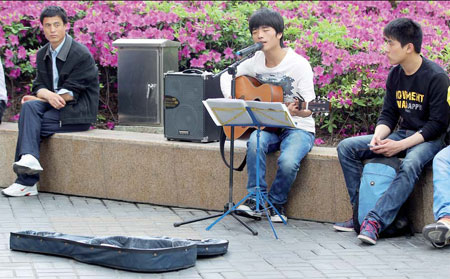IN BRIEF (Page 2)

| A young musician performs near the Super Brand Mall in Shanghai. Provided to China Daily |
Society
Legit status for street performers
Street performers in Shanghai will soon be able to play their fiddles, drums and guitars and create art and crafts without being bothered by the police or urban management officers.
The city plans to launch an administrative system that will allow street performers to show their talents legitimately. "We'll be the first city in China to open arms to buskers," said Luo Huaizhen, a playwright who for the last eight years has urged the Shanghai People's Congress to allow street performers.
On Aug 20, the city's cultural administration decided to conduct a trial operation of street performers management. The Shanghai Municipal Administration of Culture, Radio, Film and TV plans to select some public areas where the performers can set up.
Leisure
Lhasa is No 1 on happiness list
Lhasa, the city of sunlight, topped an annual survey of residents' sense of happiness in Chinese cities.
The capital of the Tibet autonomous region has been ranked top in the survey conducted by China Central Television for five consecutive years.
In this year's list, Lhasa was followed by Taiyuan, capital of Shanxi province, Hefei, capital of Anhui province, Tianjin, Changsha, capital of Hunan province, and Hohhot, capital of the Inner Mongolia autonomous region.
The capital cities where residents have the most leisure time include Guiyang, Haikou, Guangzhou, Hangzhou, Lhasa, Chengdu and Chongqing.
Around 100,000 households from 104 cities were polled for the survey.
Legal
Superstitions are out of luck
Beijing has vowed to prohibit the avoidance of "unlucky" numbers, normally deemed to include 4, 13 and 14, in the registration of addresses, an official with the city's quality watchdog said on Aug 20.
The numbers of storied buildings, units and door plates should be coded and registered in numerical order, and no skipping or selective use of numbers should be allowed, said Zhou Qiaolin, an official with the Beijing Municipal Administration of Quality and Technology Supervision.
She said the prohibition will be included in a criterion for the setting of building nameplates and door-number plates, which is to be implemented on Sept 1.
Many Chinese prefer to avoid the number four because it sounds almost exactly like the word for death in Mandarin. For this reason, some are willing to pay extra fees to register car plates or phone numbers with the number eight because it sounds similar to the words for "making a fortune".
Labor
Unions target firms over wage talks
About 95 percent of Fortune 500 companies operating in China will have collective wage bargaining by the end of 2013, a senior union official said.
Approximately 80 percent of the 4,100 enterprises set up by Fortune 500 companies in China had introduced collective bargaining by the end of 2011, said Zhang Jianguo, director of the collective contract department at the All-China Federation of Trade Unions.
Zhang said the target that the federation set in 2011 - 95 percent of Fortune 500 companies to have trade unions to carry out collective wage talks by the end of 2013 - could be reached.
Zhang said in some places the target had already been accomplished. For example, all 49 enterprises of Fortune 500 companies set up in Shenyang, Liaoning province, conducted collective wage bargaining.
Audit
Checks on vehicle use ordered
State-owned institutions, including hospitals and universities, have been ordered to audit their use of official vehicles, in yet another move aimed at curbing the misuse of public resources.
The directive follows a nationwide investigation of government and Party authorities. Results of the probe, released in June, found that 199,600 vehicles were purchased or used improperly.
The order, issued online on Aug 20 by the Ministry of Finance, says that institutional organizations registered by the end of 2011 and subject to official financing and accounting regulations must submit a report on vehicle use by Oct 31.
The goal is to "learn the number, structure, distribution and management of official cars".
Development
Wealth gap in rural areas widens
Households in rural China have seen incomes increase on average over the past three years, but the wealth gap in the vast countryside has almost reached the warning level, a top Chinese institute for rural studies said on Aug 21.
The cash income of rural households grew 14.1 percent from a year earlier to an average of 38,894 yuan ($6,125, 4,908 euros) last year, and the per capita cash income in rural areas rose 11.9 percent to 9,260 yuan, according to a survey by the Center for China Rural Studies under the Central China Normal University.
However, the wealth gap among rural households is widening. The Gini coefficient, an index reflecting the rich-poor gap, stood at 0.3949 in rural China last year, nearing the warning level of 0.4 set by the United Nations. The institute said that the total income of the top 20 percent of the rural households was 10.19 times that of the bottom 20 percent.
China Daily
(China Daily 08/24/2012 page2)
Today's Top News
- Xi stresses improving long-term mechanisms for cyberspace governance
- Experts share ideas on advancing human rights
- Japan PM's remarks on Taiwan send severely wrong signal
- Key steps to boost RMB's intl standing highlighted
- Sustained fight against corruption urged
- Xi calls for promotion of spirit of volunteerism































